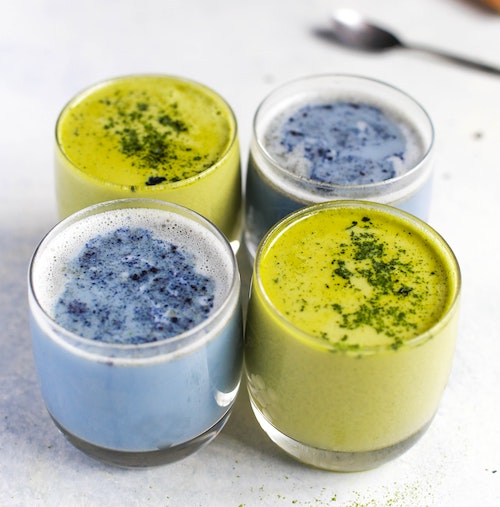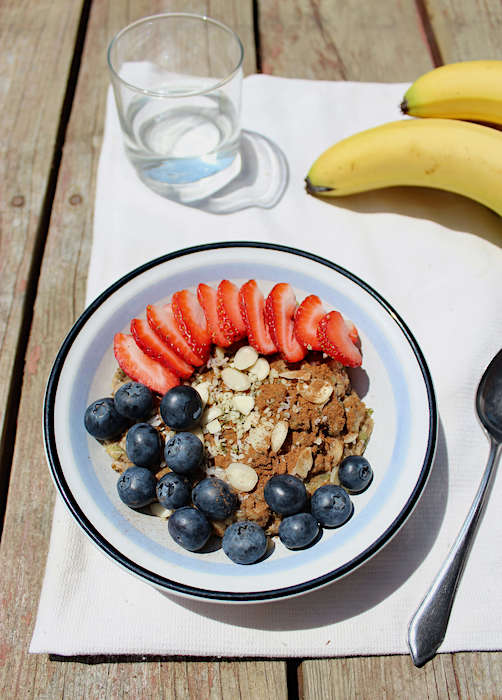Of course, there is nothing wrong with the occasional binge. However, it can become very problematic if it happens the majority of the time. Regardless of how bad your personal situation might be, I’m here to tell you that significantly improving your eating habits is completely within reach. Changing these habits on the most fundamental level simply starts with becoming aware of your detrimental core beliefs about eating healthier and rewiring those beliefs, which I personally believe anyone is capable of.
It is no secret that our thoughts affect our behaviour, so it should come as no surprise that one of the best ways to overcome detrimental behavioural patterns is by reframing our thoughts.
Unfortunately, it can be incredibly hard to eat healthy when there are so many unhelpful thoughts swirling around in your head constantly, especially if you are unaware of them. However, many of these thoughts are biased, completely false, and extremely unrealistic.
It can be tremendously helpful to recognize and observe these thoughts as they surface, and to immediately question and analyze them critically, especially when they carry the potential to negatively impact our behaviour. Being able to do this regularly may take some practise, but will be hugely empowering to be able to do and may even strengthen ourselves mentally and emotionally, so it’s definitely worth trying out! To help you with this, I have analyzed some of the most common negative beliefs that seem to hold people back from making healthier decisions below for you.
3 Most Common Beliefs Holding You Back from Making Healthier Decisions
- . “I’ll start tomorrow.”
-
We are all no strangers to this age-old excuse when it comes to eating healthy, exercising, and practising any other kind of habit that we’re trying to adopt. But what many of us don’t consciously realize is that any time we use this excuse on ourselves, what we’re really saying to ourselves is: “I’ll eat healthier later in my life, when I’m less busy and there is more balance established in my lifestyle, and/or the conditions are perfect and it is easier to do so.”

I am completely guilty of thinking these thoughts to myself, as someone who has frequently sacrificed on self-care in order to meet deadlines or complete more work. But will there ever be balance? Will our life ever be perfect, or identical to our ideal visions for the future?
We shouldn’t just assume that these ideal days in the future will come and passively wait for them. Instead, we should actively assume responsibility for our choices and current lifestyle now. If we wait for perfect conditions to start doing what we plan on doing eventually, we may waste our entire precious lives waiting, and wondering why we didn’t start sooner.
It is completely okay to start planning how you will make healthier decisions slightly in advance, but actually start DOING it soon after. Never rely on perfect conditions to start doing things that are important to you, because the timing to start will never feel perfectly right.
- . “I can just abstain from eating anything unhealthy at home and buying anything unhealthy.” Translation: there’s no need to ever learn moderation.
-
Let’s be honest; this isn’t the most realistic belief you’ve ever had. Often, you can make your environment work for you, especially in your own home. But sometimes, you will get cravings that you will “need” to satisfy, and that is okay and completely normal. And in many cases, the food that you are surrounded by is completely out of your control.
You may travel, eat out with your friends, or people may buy you very tempting, unhealthy food. When you go outside, you may pass by a bakery that smells absolutely delicious, there may be free pizza offered at work, your spouse/partner might constantly eat unhealthy foods around you, etc.
Being surrounded by a ton of junk food isn’t always avoidable; hence it is much more realistic to learn how to practise moderation than to expect the external world to always be ideal for you and overestimate your will power and ability to completely abstain from unhealthy foods at all times.
Abstaining from unhealthy foods in your own home is great, but relying solely on self-restraint is not the best or most realistic strategy to eating healthy in the long run. At some point, you’ll want to learn how to practise moderation in order to free yourself from this unstable, never-ending pattern of cycling through periods of eating very healthy for a while, and then not eating in a healthy way for long stretches of time, especially if you’re constantly surrounded by people or environments that challenge your will power. Developing this ability will be hugely liberating, freeing, and empowering, as you will generally feel much more in control of yourself when tempted.
- . “Being hard on myself helps me to eat better.”
-
Doing this might work for a little while, but it certainly won’t work well long-term.
We tend to be hard on ourselves because we fear that being kind to ourselves will ultimately lead to us becoming self-indulgent.

However, contrary to what many people believe, constantly shaming yourself generally does not work in your favour, and actually impairs your will power and ability to resist temptation in the long run.
In fact, I find that those who are the hardest on themselves tend to be the ones who struggle with moderation the most, due to having very extreme black and white thinking about what is viewed as okay to do versus what isn’t.
This problematic thinking style often manifests as imposing on oneself extremely rigid rules and expectations regarding what to eat and when to eat. These expectations are often so harsh and restrictive that they are almost impossible to maintain—especially long-term or whenever life gets busier or more complicated.
For example, an extremely harsh and rigid rule that would be difficult to maintain long-term might be: “I’m not allowed to eat anything for the next 24 hours any time I binge or eat something unhealthy.”

Over time, such unrealistically high expectations actually work against you by maintaining the vicious cycle of binge eating. When an individual possesses such unrealistically high expectations, failing to adhere to them long-term is inevitable. Nevertheless, this makes such a person feel absolutely terrible about themselves, as they believe that failing means that they are self-indulgent, lazy, and undisciplined (due to their black-and-white mindset), and mistakenly assume that the answer to everything is more discipline.
This leads them to place even more rigid, unrealistic expectations on themselves, since they assume they are “failing” because they haven’t been hard enough on themselves. Consequently, every time they “fail”—which occurs more and more frequently as their expectations become increasingly rigid and challenging to follow—their all-or-nothing mentality leads them further astray. It causes them to think, “well I’ve already failed, so there’s no use in still trying—I might as well allow myself to cheat for the rest of the day since I’m so pathetic!” This cheat “day” then turns into at least a week or two (but often longer).
Having an all-or-nothing mentality about success and failure—resulting in not allowing room for making mistakes—prevents people from ever developing the ability to efficiently bounce back from binges and practise moderation. Instead, it causes them to perceive failure as a fixed, final outcome, and so they often view mistakes or failing as reasons to give up on trying altogether, since they’ve “already messed up”, rather than recognizing them as opportunities to try again (which is really any moment).
People continue this vicious cycle of binging, failing to ever acknowledge the fact that being harsh on themselves actually makes things worse, and that they would be far better off long-term if they were kind and patient with themselves, allowing themselves time and space to “fail” as they learn to develop the skill of moderation and maintaining a healthy balance. It is so important to recognize that failure is inevitable, especially at first, since no skill can ever be developed sufficiently right away.

As cheesy as it may sound, self-love is ultimately what will allow us to keep trying, even when we don’t like what we see, go through a rough patch, feel unmotivated, and/or want to give up. It provides us with faith, grit, drive, and determination, as it is the part of ourselves that ceaselessly wants the best for ourselves and wholeheartedly recognizes our potential, so it never gives up trying to reach for it. It NEVER gives up on ourselves because it views situations and circumstances from a very wide and clear perspective, perceiving setbacks or difficulties as small experiences that are all necessary parts of our journey to achieving self-mastery.
So please note that being able to practise moderation skillfully might take some time, and try to be as patient with yourself as possible in the process. It may take an entire lifetime to learn how to practise it according to your standards, but I believe your health will still thank you in the long run and you will be far more proud of your progress if you treat yourself in a more loving and compassionate way, as long as you keep trying.
While the following points are discussed within the context of physical health, they really are relevant to almost any facet of life. All these negative beliefs are akin to the kinds of detrimental beliefs anyone might have when trying to achieve nearly anything, whether it’s adopting a healthy lifestyle, succeeding in a career pursuit, etc. Ultimately, by becoming aware of the logical flaws that exist within our deeply held beliefs, as well as by being kinder to ourselves, we can shift our mindset into a state conducive for success.
What kinds of false, negative health beliefs have you discovered within yourself?
Related Posts:
Healthy Snacks & Teas
In order to be able to maintain a healthy diet, it helps to have a wide supply of healthy…
Small, Simple Ways to Easily Make Healthier Decisions
With the use of a few simple tips, leading a healthy lifestyle doesn’t have to be as hard or as…
Creamy Banana Zoats (Zucchini Oats)
There are so many things I love about this banana zoat recipe! In fact, here’s a…
Disclaimer: Some of the links on this site may be sponsored, meaning that I may earn a small commission or other compensation from them at no additional cost to you. All the content on this website is intended for informational purposes only, based on my own personal experience, ideas and knowledge. It is not intended to replace the advice of a qualified professional. In the case of a mental, emotional or physical emergency, please dial 911 or the crisis line in your region immediately.




This is a great advice! Keep it up!
So glad to hear you liked my advice and thanks so much for the encouragement Amy!